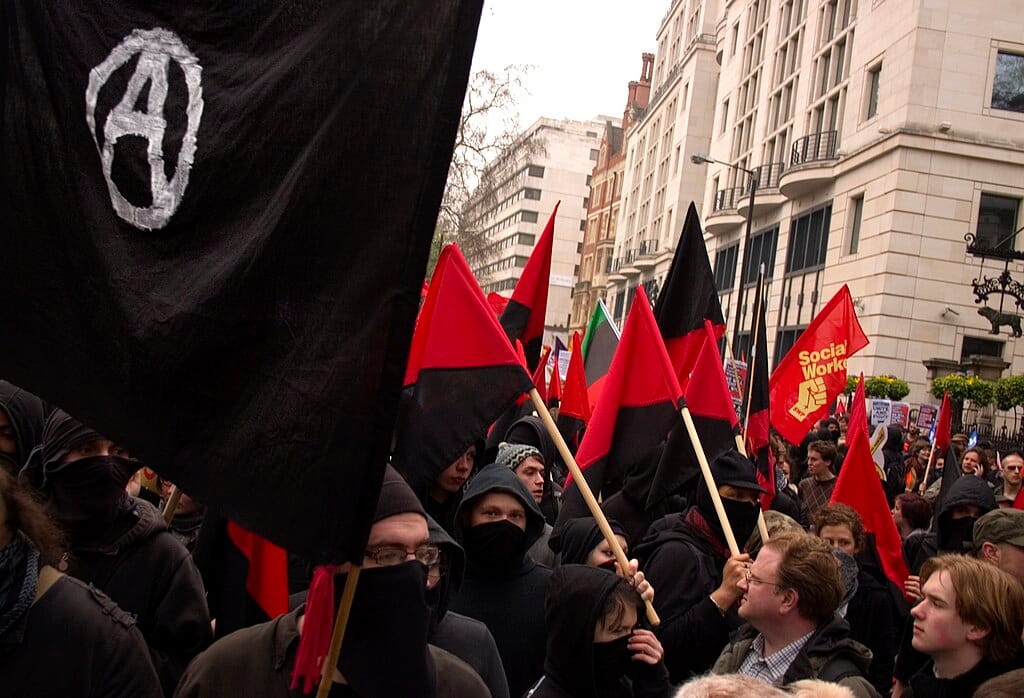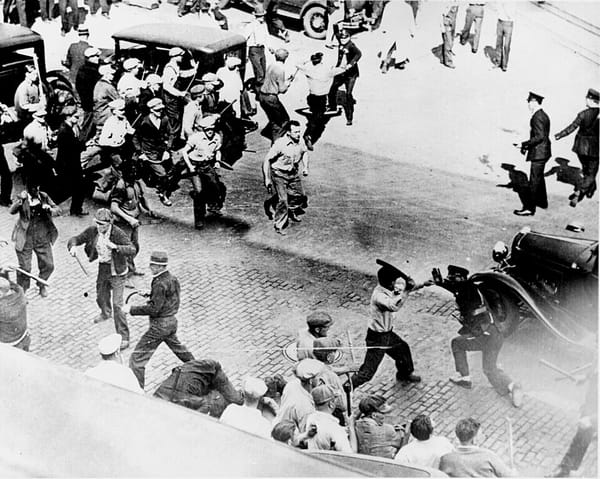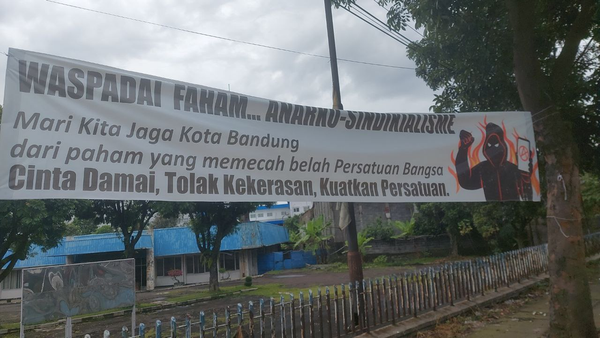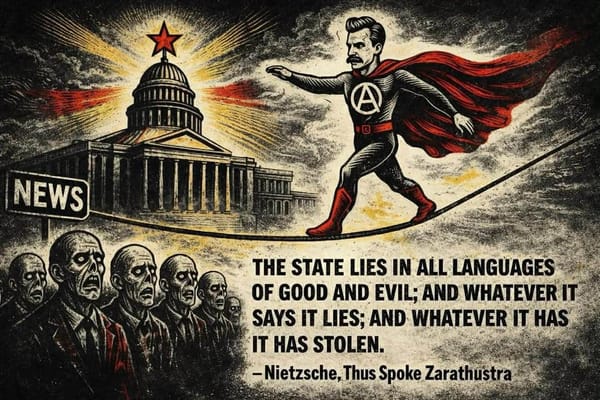Anarchism and Democracy

The basic democratic idea is rule by the people. That is democratic politics is politics under the control of some popularly defined grouping. In liberal democratic nation-states that group in who's name the state rules is the legally defined citizen of the nation who is either a descendent of citizens or has gone through some meritocratic process of naturalization. Democratic states which have undergone, or are currently undergoing, a process of dismantling civil rights guarantees, the rule of law, and separation of powers (illiberal, or illiberalizing democracies) increasingly rule exclusively in the name of an ethno-culturally and/or moralistically defined national community. The "democratic centralism" of communist states is/was rule in the name of the revolutionary workers and peasants engaged in the struggle against capitalism and imperialism. All of these forms of state derive their legitimacy from the consent (whether it be politically passive consent in day-to-day life, or politically active consent in the form of activism that supports the regime) of a popularly defined group.
Democracy in this sense contrasts with monarchy in that the latter legitimates itself through the right of the individual at the head of the state, rather than the consent and interests of a popular mass base. All of these forms of democratic politics are critiqued for not really being democratic since none of them allow for full public participation in political decision making. However, this critique is fairly facile since there is nothing in the basic concept of democratic politics which prescribes such participatory and direct forms of democracy. The point of the democratic state is to act as the central political authority that manages class conflict in the interests of a popular constituency. Doing this requires excluding whole sections of society from the political process since class antagonism and centralized political power are not compatible with full collective participation in the organization of social life. In the ideological conception of democratic statism, it is thus necessary to mediate political participation through bureaucratic and coercive power structures.
Anarchists, as opponents of all states, are opponents of the democratic state. This is because according to Anarchists there should be no sovereign authority which constricts free arrangements between individuals and participation in social organization from above. The question then arises as to whether Anarchists are proponents of some anti-state form of direct democracy or are opponents of democracy as such. Different Anarchists answer this question differently, but I want to suggest that the answer is more ambiguous than either answer would imply on its own. I want to argue that the consistent position for Anarchists to take on the question of democracy is that Anarchism implies a transitional, anti-state proletarian democracy which upon completion of the class struggle, dissolves into a non-political form of social life which is thus not democratic despite including the fullest possible degree of collective participation in social decision making.
Anarchism is the decentralist variant of socialism. Socialism is the political ideology and philosophy that calls for the overthrow of class society and its replacement by collective control and administration of social production by free producers' associations. Thus, even the most authoritarian variants of socialist ideology maintain an ultimate vision of a society without centralized social, or political power. However, various centralist versions of socialism argue that the transition from the capitalist to socialist mode of production can only be affected by a centralized political power through the socialist party and socialist state. Anarchists on the other hand argue that centralism in the political transition will merely reproduce itself by entrenching class divisions that favor a ruling elite and will thus produce an internal counterrevolution that blocs the transition to the classless society.
Thus, Anarchists advocate a decentralized network of self-organizing worker/peasant associations to carry out the process of political transition to socialism and thus prescribe the destruction of the state instead of its seizure. Sometimes Anarchists will insist that this anti-state posture implies opposition to democratic politics as such, but this is only true if one assumes democratic politics, are inherently statist. There's not much reason to think this. It seems that control of society by revolutionary workers and peasants in decentralized and self-managing institutions is a form of popular political power. It's control of society by a popularly defined social group which advances political objectives in the interests of said group.
However, it seems far too hasty to categorize socialist society itself as a form of non-state direct democracy. The central occupation of 'politics' as a form of human activity and enquiry since antiquity has been the management of class conflict. Every state that has ever existed has managed class conflict. Every political ideology which has ever existed has prescribed a way of dealing with the reality of class conflict. Political science as the modern form of social scientific investigation of politics investigates the social mechanisms that interact with class conflict.
Harold Barclay suggests that non-class indigenous societies had politics because they had mechanisms for managing social affairs, but as his and other work on pre-state societies testifies these societies did not have to create social institutions which managed fundamental conflicts over resource distribution and social control. Instead, social production was collectively controlled by the tribal society and cooperation and compromise stood in place of coercion as the main mechanism of ensuring social stability. So, the classless nature of pre-historic tribal societies meant that they did not have politics in the sense of institutional and intellectual mechanisms for coercive enforcement of social stability and resource distribution which characterizes what is called "politics" from ancient Greece and Rome to Donald Trump. The socialist mode of production being classless would thus constitute the overcoming of politics altogether.
The decentralized structures of revolutionary worker/peasant control would dissolve once counterrevolutionary mobilizations have been defeated as class conflict would cease once social production is brought under the full control of free producers' associations. There would no longer be social classes, but instead a free and classless human community. So, the Anarchist social revolution would erect an anti-state form of proletarian direct democracy, however the completion of the class struggle and ending of class society would end politics, and since democracy is a form of politics, would thus end the need for democracy. This is despite the fact that the socialist society would be the most participatory society to ever exist on account of all institutions being constituted by self-governing voluntary associations.
If my argument goes through, then Anarchists are not straightforward opponents of democracy despite opposing all forms of state power. However, the end goal of Anarchism renders democracy as with all politics superfluous. Thus, Anarchists are advocates of a purely transitional form of proletarian democracy as instrumental to the creation of a classless society. The disappearance of class conflict in socialist society thus means the disappearance of all forms of "rule", democratic, or otherwise.
Sources:
Politics, Tansey and Jackson
Anarcho-Syndicalism in the 20th Century, Damier
Statism and Anarchy, Bakunin
Anarcho-Syndicalism: Theory and Practice, Rocker
Anarchy, Malatesta
Conquest of Bread, Kropotkin
The State: Its Historic Role, Kropotkin
Libertarian Communism, Puente
https://www.journalofdemocracy.org/articles/illiberal-democracy-and-the-struggle-on-the-right/
The Rise and Demise of World Communism, Breslauer
The State, Barclay





